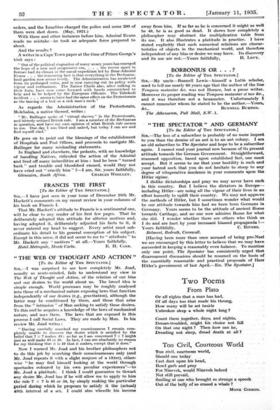" THE WEB OF THOUGHT AND ACTION " [To the
Editor of THE SPECTATOR.] SIR,—I was surprised to see how completely Mr. Joad, usually so acute-minded, fails to understand my view in The Web of Thought and Action, of the relation of our bias and our desires to the world about us. The broad idea is
simple enough. World processes may be roughly analysed into those of a mechanical nature exposing laws that function independently of our desires (e.g., gravitation), although the latter may be conditioned by them, and those that arise from the " intrusion " of Man seeking to satisfy these desires. To this end•he acquires a knowledge of the laws of mechanical nature, and uses them. The laws that are exposed in this process I call Social Laws. They are made by Man. In his review Mr. Joad writes :
" Raving carefully searched my consciousness I remain com- pletely unable to discover the desire which is satisfied by the belief that 7 x 7 makes 49 ; so far as I am concerned 7 x 7 might just as well make 48 or 50. In fact, I can see absolutely no reason for my thinking that it is 49 that it makes, except that it does."
Now I warned Mr. Jowl and his brother philosophers not to do this job by searching their consciousnesses only (and Mr. Joad repeats it with a slight soupcon of a titter), other. wise " he may find himself looking at the world through spectacles coloured by his own peculiar experiences"—to Mr. Joad a platitude. I think I could guarantee to thwart any desire Mr. Joad has if he will allow me to apply to him the rule 7 x 7 is 48 or 50, by simply making the particular period during which he proposes to satisfy it the (actual) 49th interval of a set. I could also wheedle his income
away from him. If as far as he is concerned it might as well be 48, he is as good as dead. It shows how completely a philosopher may abstract the multiplication table from its use. It also illustrates a platitude in practice. I have stated explicitly that such numerical relations are charac- teristics of objects in the mechanical world, and therefore independent of any bias or desire we may have. Its discovery and its use are not.—Yours faithfully, H. LEVY.






































 Previous page
Previous page